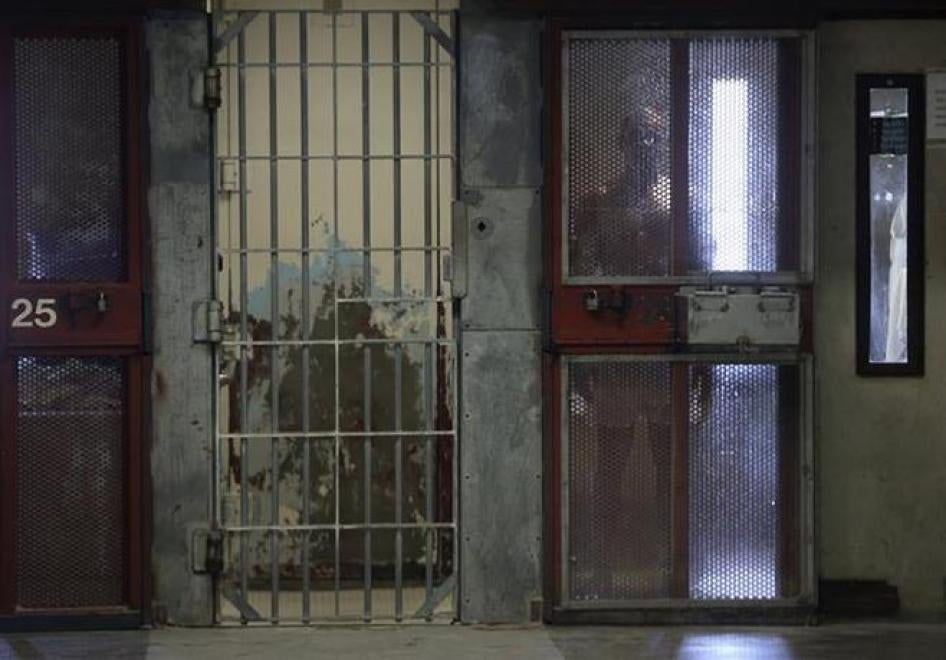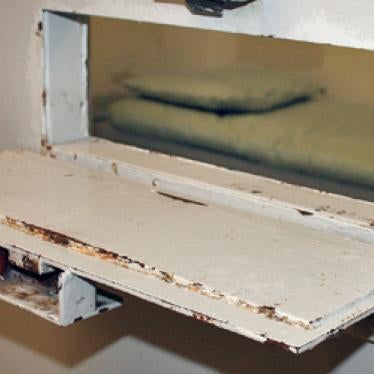Sent via email
MEMO OF SUPPORT FOR S.1623/A.2500
Dear Senator Stewart-Cousins and all New York Senators, as well as Speaker Heastie and all New York Assembly Members:
Human Rights Watch urges the New York Senate and the New York Assembly to pass the HALT Solitary Confinement Act, S.1623/A.2500,[1] immediately, in its current form.
Human Rights Watch is a nonprofit, nongovernmental, human rights organization made up of more than 400 staff members around the globe. We publish more than 100 reports and briefings on human rights conditions in some 90 countries each year, generating extensive coverage in local and international media. Since 1980, we have reported on prison conditions within the United States from a human rights perspective, and extensively on the use of solitary confinement. We have conducted investigations in numerous prisons, including prisons in New York; spoken with officials and inmates about solitary confinement; published many reports and commentaries on the issue; and advocated against its misuse.[2
Summary of Need to Pass the HALT Act
New York has reduced the use of solitary confinement in recent years,[3] but the state still holds a higher number of people in solitary, about 7 percent of its prison population, than the national average which is 4.4 percent.[4] On any given day, around 2,400 people,[5] disproportionately Black and Latino,[6] are housed in solitary confinement units known as Special Housing Units or SHUs in New York State prisons. This does not include those kept in “Keeplock” (in their own cells not SHUs), estimated to be approximately another 1,000 people,[7] or youthful offenders.[8] In these isolated conditions they are confined to small, sometimes windowless cells, usually the size of an elevator, for 22 to 24 hours a day without any meaningful human contact or programs, for months, years,[9] and sometimes for decades.[10] Phone calls and visits by family and loved ones are severely restricted or prohibited. A few times a week, people in solitary are let out for showers and exercise alone in a small, enclosed space, sometimes indoors. They often have extremely limited or no access to educational and recreational activities or other sources of mental stimulation, and they are usually handcuffed, shackled, and escorted by correctional officers when they leave their cells.[11]
"I’ve experienced times so difficult and felt boredom and loneliness to such a degree that it seemed to be a physical thing inside—so thick it felt like it was choking me, trying to squeeze the sanity from my mind,” wrote William Blake, an inmate in one New York’s state prisons then serving his 27th year in solitary confinement.[12]
People subjected to prolonged isolation may experience depression, despair, anxiety, rage, claustrophobia, hallucinations, problems with impulse control, and/or an impaired ability to think, concentrate, or remember. People subjected to solitary confinement develop clinical symptoms usually associated with psychosis or severe affective disorders. Solitary confinement is not only extremely painful for many, it can be literally unendurable, as is evident from the high number of suicides that take place in segregation.[13]
For the mentally ill, prolonged solitary confinement can be a living horror; the social isolation and restricted activities can aggravate their illness and immeasurably increase their pain and suffering. Our research indicates that anywhere from one-fifth to two-thirds of those held in solitary confinement have a serious mental illness which was diagnosed or manifested before isolation.[14]
Youth are also especially vulnerable to the destructive impact of solitary confinement.[15] Though New York city recently banned solitary confinement for people younger than 22,[16] those under 18 continue to be placed in solitary confinement in other parts of the state.[17]
We recognize that there may be instances in which people need to be temporarily separated from the general population in order to protect prison safety and security. But our research has shown that all too frequently, lengthy periods of isolation are imposed for minor misconduct, that the periods of such confinement extend far beyond what might be reasonable to secure changes in prisoners’ conduct. It has also shown that alternatives to solitary are equally likely to secure those changes, and that the conditions of solitary confinement are needlessly harsh, counterproductive, and inconsistent with recognition of each person’s basic humanity and dignity. In short, in many cases, prolonged solitary confinement violates the international prohibition against cruel, inhuman, and degrading treatment and may even amount to torture.[18] Further, states that have reduced the use of solitary significantly have seen positive outcomes, so much so that “corrections officers who had initially opposed [the changes] changed their minds after they began to see positive results.”[19]
The HALT Solitary Confinement Act would: 1) limit of the use of solitary confinement to 15 consecutive days in line with the United Nations’ “Mandela Rules,”[20] which provide authoritative guidance on good detention practices and also set a 15-day maximum for any reason; 2) create more humane and effective alternatives to solitary that involve meaningful out-of-cell human contact and programs; 3) restrict the criteria that can result in solitary or alternative separation to the most egregious conduct in need of an intensive intervention; 4) ban certain groups of people from spending even one day in solitary and ending solitary confinement in protective custody units; 5) enhance procedural protections, staff capabilities, and transparency and accountability through mandatory reporting and outside oversight.[21]
Over 120 NY legislators, including 99 New York Assembly members who voted to pass the HALT Solitary Confinement Act in 2018, and more than a majority of New York Senators support passing the bill now.[22] Human Rights Watch urges New York legislators to no longer delay passage of this bill. Legislative leaders should bring the bill to the floor for a vote now and send it to the Governor for signature.
Laura Pitter
Deputy Director, US Program
Human Rights Watch
[1] “Humane Alternatives to Long-Term Solitary Confinement" Act (the HALT Solitary Confinement Act.), S.1623/A.2500, New York State Assembly, March 5, 2019, https://nyassembly.gov/leg/?default_fld=&leg_video=&bn=A02500&term=2019&Summary=Y&Actions=Y&Committee%26nbspVotes=Y&Floor%26nbspVotes=Y&Memo=Y&Text=Y#jump_to_Text (accessed April 29, 2019).
[2] See, for example; Human Rights Watch and the American Civil Liberties Union, Growing Up Locked Down: Youth in Solitary Confinement in Jails and Prisons Across the United States,” October 2012, https://www.hrw.org/news/2012/10/10/us-teens-solitary-confinement; “US: Look Critically at Widespread Use of Solitary Confinement,” Human Rights Watch Statement for Committee Hearing, June 18, 2012, https://www.hrw.org/news/2012/06/18/us-look-critically-widespread-use-solitary-confinement#_ftn1; Human Rights Watch, Cold Storage: Super-Maximum Security Confinement in Indiana, October 1, 1997, https://www.hrw.org/reports/1997/10/01/cold-storage; Human Rights Watch, Red Onion State Prison: Super-Maximum Security Confinement in Virginia, May 1, 1999, https://www.hrw.org/reports/1999/05/01/red-onion-state-prison; Human Rights Watch, Out of Sight: Super-Maximum Security Confinement in the US, February 1, 2000, https://www.hrw.org/reports/2000/02/01/out-sight-super-maximum-security-c... Human Rights Watch, Ill-Equipped: U.S. Prisons and Offenders with Mental Illness, October 22, 2003, https://www.hrw.org/reports/2003/10/21/ill-equipped-0; Jamie Fellner, “A Corrections Quandary: Mental Illness and Prison Rules,” Harvard Civil Rights-Civil Liberties Law Review, vol. 41, 2006, https://www.hrw.org/news/2006/07/01/corrections-quandary; “Mental Illness, Human Rights, and US Prisons,” Human Rights Watch written statement to the Senate Judiciary Committee Subcommittee on Human Rights and the Law, September 22, 2009, https://www.hrw.org/news/2009/09/22/mental-illness-human-rights-and-us-pr... Human Rights Watch, Against All Odds: Prison Conditions for Youth Offenders Serving Life without Parole Sentences in the United States, January 4, 2012,https://www.hrw.org/reports/2012/01/03/against-all-odds-0
[3] Annual Update, New York State Department of Correction, August 2018, http://www.doccs.ny.gov/DoccsNews/2018/Annual%20Update%20-%202018.pdf (accessed April 26, 2019); Ashley Southall and Jan Ransom, “New York City’s Young Inmates are Held in Isolation Despite Ban,” New York Times, July 22, 2018 https://www.nytimes.com/2018/07/22/nyregion/inmate-solitary-young-nyc.html (accessed April 28, 2019).
[4] “Reforming Restrictive Housing: The 2018 ASCA-Liman Nationwide Survey of Time-in-Cell,” The Association of State Correctional Administrators The Liman Center for Public Interest Law at Yale Law School, October 2018, https://law.yale.edu/system/files/documents/pdf/Liman/asca_liman_2018_restrictive_housing_revised_sept_25_2018_-_embargoed_unt.pdf, (accessed April 25, 2019), p. 4.
[5] “DOCCS Fact Sheet,” New York State Corrections and Community Supervision, April 1, 2019, http://www.doccs.ny.gov/FactSheets/PDF/currentfactsheet.pdf, (accessed April 24, 2019), p. 4.
[6] Michael Schwirtz, Michael Winerip and Robert Gebeloff, “The Scourge of Racial Bias in New York State’s Prisons,” New York Times, Dec. 3, 2016, https://www.nytimes.com/2016/12/03/nyregion/new-york-state-prisons-inmates-racial-bias.html (accessed April 24, 2019) (“At Clinton, a prison near the Canadian border where only one of the 998 guards is African-American, black inmates were nearly four times as likely to be sent to isolation as whites, and they were held there for an average of 125 days, compared with 90 days for whites”); “Solitary at Southport,” The Correctional Association of New York, 2017, https://static1.squarespace.com/static/5b2c07e2a9e02851fb387477/t/5c4f5bd8562fa7fb256b550d/1548704749745/2017+Solitary+at+Southport.pdf, (accessed April 28, 2019), p. 2
[7] Solitary at Southport, p. 2; “Boxed In: The True Cost of Extreme Isolation in New York’s Prisons,” American Civil Liberties Union, October 2, 2012, https://www.nyclu.org/sites/default/files/publications/nyclu_boxedin_FINAL.pdf (accessed April 29, 2019), p. 12; “Testimony for NYS Public Protection Budget Hearing,” The Campaign for Alternatives to Isolated Confinement, (CAIC), January 29, 2019, https://nyassembly.gov/write/upload/publichearing/000957/001758.pdf (accessed April 28, 2019); Conservative estimate from CAIC on file with Human Rights Watch based on visits to New York State Prisons.
[8] DOCCS Fact Sheet, p. 4.
[9] Solitary at Southport, p. 2.
[10] “Voices from Solitary Confinement,” The Takeaway, February 16, 2016, https://www.wnycstudios.org/story/voices-solitary-confinement (accessed April 24, 2019) (reporting about William Blake then in his 27th year of solitary confinement); Proctor v. LeClaire, 846 F.3d 597, 600 (2d Cir. 2017), https://cases.justia.com/federal/appellate-courts/ca2/15-3673/15-3673-2017-01-24.pdf?ts=1485271806 (accessed April 28, 2019) (vacating and remanding grant of summary judgement granted defendant appellee department of corrections finding that where an inmate had spent the last 22 years in solitary confinement, the last 13 years in Administrative Segregation, the record presented triable issues of fact regarding his procedural due process claim, as there were factual questions about whether review of his continued isolation had been meaningful).
[11] Solitary at Southport, pp. 2-8.
[12] Voices from Solitary Confinement, The Takeaway; See generally, “Boxed In: The True Cost of Extreme Isolation in New York’s Prisons,” American Civil Liberties Union.
[13] “Seeing into Solitary: A Review of the Laws and Policies of Certain Nations Regarding Solitary Confinement of Detainees,” Weil, Cyrus R. Vance Center for International Justice, Anti-Torture Initiative, September 2016, (“In addition to increased psychiatric symptoms generally, suicide rates and incidents of self-harm are much higher for prisoners in solitary confinement”), https://www.hrw.org/news/2012/06/18/us-look-critically-widespread-use-solitary-confinement#_ftn1 (accessed April 27, 2019), p. 11.
[14] ”US: Look Critically at Widespread Use of Solitary Confinement,” Human Rights Watch Statement for Committee Hearing.
[15] See generally, Human Rights Watch and the American Civil Liberties Union, Growing Up Locked Down.
[16] Michael Winerip and Michael Schwirtz, “Rikers to Ban Isolation for Inmates 21 and Younger,” New York Times, January 13, 2015, https://www.nytimes.com/2015/01/14/nyregion/new-york-city-to-end-solitary-confinement-for-inmates-21-and-under-at-rikers.html?module=inline (accessed April 29, 2019); Ashley Southall and Jan Ransom, “New York City’s Young Inmates Are Held in Isolation Upstate, Despite Ban,” New York Times, July 22, 2018, https://www.nytimes.com/2018/07/22/nyregion/inmate-solitary-young-nyc.html (accessed April 29, 2019).
[17] Ashley Southall and Jan Ransom, “New York City’s Young Inmates Are Held in Isolation Upstate, Despite Ban,” New York Times, July 22, 2018, https://www.nytimes.com/2018/07/22/nyregion/inmate-solitary-young-nyc.html (accessed April 29, 2019).
[18] See, for example, Growing Up Locked Down, pp. 81-88; “US: Look Critically at Widespread Use of Solitary Confinement,” Human Rights Watch Statement for Committee Hearing.
[19] Rick Raemisch, “Why We Ended Long-Term Solitary Confinement in Colorado,” New York Times, Oct. 12, 2017,
https://www.nytimes.com/2017/10/12/opinion/solitary-confinement-colorado-prison.html (accessed April 28, 2019).
[20] “United Nations Standard Minimum Rules for the Treatment of
Prisoners (the Mandela Rules),” May 21, 2015, http://solitaryconfinement.org/uploads/MandelaRules2015UNdocRev.1.pdf (accessed April 28, 2019).
[21] “Testimony for NYS Public Protection Budget Hearing,” CAIC, , January 29, 2019, https://nyassembly.gov/write/upload/publichearing/000957/001758.pdf (accessed April 28, 2019), p. 1.
[22] Ibid.








